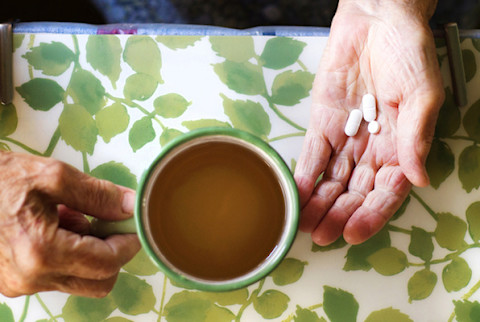
As a clinical herbalist and a wellness coach, people make certain assumptions about me — it just comes with the territory. And, on Friday night, the territory spread itself to a Pharmacy Week party to celebrate the significant strides that clinical pharmacists like my boyfriend Garrett are making in managing and treating chronic disease.
As Garrett introduced me to decorated health care professionals from across the hospital, everyone had only one question for me: "So, you're totally against people being on drugs, right?"
Now, living with a clinical pharmacist brings a whole new meaning to the phrase "taking your work home." In a house where medicine is made in the kitchen and where health care debates are just dinner table chatter, I'm no stranger to the drug conversation.
So I smiled, sipped my drink, and answered the only way I know how: "I'm a fan of anything that can improve people's lives. Both herbs and medication are a great crutch to get your body back in line. I think they both have a place in health care today, and I don't think it's my business to judge what that place is for each patient or client."
"OK," one pharmacist shot back to my overly diplomatic answer. "But would you ever take a medication? I mean, can you still be a wellness professional and take medication?"
Maybe it was the cocktail in my hand, but the question set me off-balance. I couldn't even remember the last time I had taken an aspirin. I've used diet, herbs, exercise, acupuncture, talk therapy, and a million other modalities to treat my own anxiety, depression, acid-reflux, and pancreatitis. But would I take a medication?
"Of course I would," I replied. "I'd take anything I need. I'm not sure I can tell you when I'd switch from herbal to antibiotic or when I'd start on an antidepressant if things were bad, but there's no shame in taking a medication if I felt I needed it."
When I got home, I was still thinking about the medication question when a Facebook status by Marianne Williamson caught my eye: "Sadness is not a disease. We don't need pharmaceuticals to get through a dark night of the soul."
While she has since clarified that she was referring to our culture's general avoidance of sadness and not to mental illness cases, the resulting debate made me realize just how much judgment and stigma there is in the medication discussion — from both sides of the aisle.
I started to think about dogmas and stigmas. So often, in the wellness world, we see dogmatic allopathic doctors pushing drugs at us and disregarding natural approaches. But it occurred to me that, just as often, the judgment is flying the other way. I've had clients come to me terrified that I'd judge them for taking "too many medications." I've had friends shamefully admit that, despite trying many holistic approaches, they needed to get on an anti-anxiety pill. I've seen looks of disgust in wellness circles where someone confessed to giving her children antibiotics.
I thought about that question: "Would I ever take medication?" Ever is a long time. I've gone back on my word enough times in my life to know that blanket statements and dogmas usually leave you with your foot in your mouth. Even if I believed with 100 percent certainty that medication is not for me, it's not my business to shove that belief onto anyone else — least of all my clients.
Every person has the right to decide what is best for his or her body. Sure, education is really important. We want people to make the most educated decisions for themselves. But dogma isn't. It doesn't matter what we believe is best for them; it matters what they believe is best. Because it's their body. It's their life.
There's no shame in taking medication or going natural. There's no judgment whether you run 10 miles a day or just from the couch to the kitchen. It's your life, and nobody has any right to tell you how to live it. Of course, like everything else, there are consequences to any action (or inaction), but you are the only person responsible for and in control of your life, and that means you get to make the decisions for how you live it.
One moment Friday night really summed everything up for me. I was in the middle of a passionate discussion about blood pressure guidelines; to my left, Garrett was showing off what he learned about Chinese facial diagnoses; and to my right, a pharmacist was talking about how she reads MindBodyGreen religiously, if you can believe it. And I realized that dogmas make life easy to follow, but they're a waste of time. We're not clichés; we're people. We're complex.
We can decide what is best for us every single moment. We can decide to go herbal one moment and pharmaceutical the next. We can decide to try acupuncture then head to our dialysis appointment.
We can screw the rules and live our lives the way we want to. And no one else can judge that.
